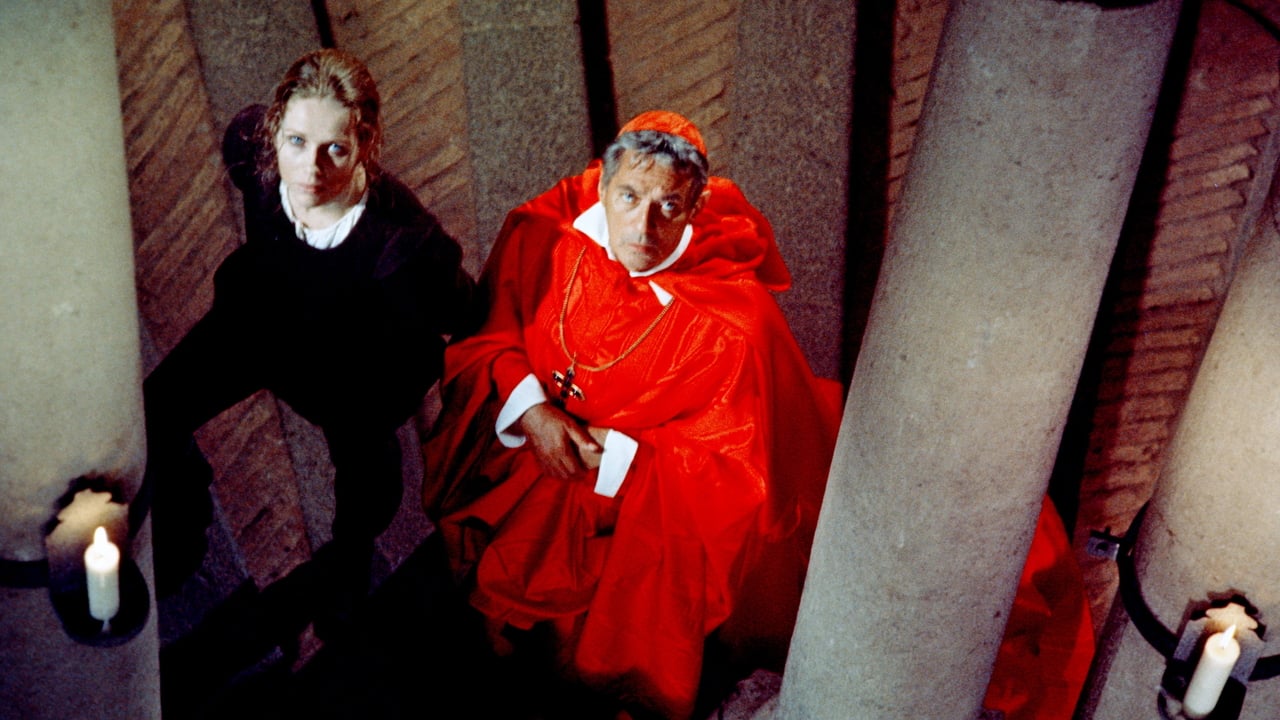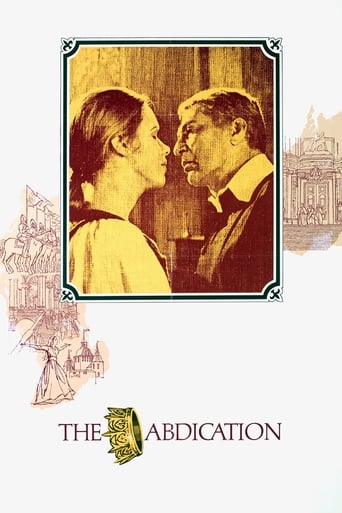

After Greta Garbo abdicated as Queen Christina of Sweden, she caroused through Europe for a year and finally came to Rome, where she expected to be instructed in Catholicism by the Pope. Somewhere along the way, however, she had become Liv Ullman, and now had to pass Peter Finch as Cardinal Azzolino. Is she sincere?Peter Finch plays his role as if he's Laurence Harvey: dry, repressed, intellectual and prosecutorial, while Miss Ullman dances around him, serious and light-hearted, all over the shop emotionally. It's just the sort of movie that Anthony Harvey had directed with A LION IN WINTER. If the fireworks are not as spectacular, well, neither are the lead actors as big on the screen as Hepburn and O'Toole. This pair play guarded characters who show through in flashes, and must compete not only with their own natural beauty, but the spectacular location shots. It's a movie that requires a dedicated and attentive viewer. I can see how it must have worked sensationally as a two-actor play by Ruth Wilson. When she opened the script slightly for the big screen, did a fine job. However the results fall slightly short if the director's earlier masterpiece. It's a fine movie, but definitely not one to watch on a small screen.
... View MoreThough not as regal and alluring as Greta Garbo in her heavily fictionalized biography Queen Christina, Liv Ullmann gives us a different Christina. In The Abdication Liv Ullmann gives us a woman who is seized by her new religion, but her new religion doesn't know quite what to make of her. It's 1655 and this film kind of takes off where Garbo's Queen Christina ended. Liv's already abdicated and she's arrived at the Papal Court, traveling incognito with only her former dwarf jester Michael Dunn accompanying her.Eager and willing she arrives saying she's to be a servant of Roman Catholicism. Maybe in the next couple of centuries she would have been welcomed no questions asked. But this was the 17th century the age of the Reformation and Counter Reformation. Religion and politics blended so well in Europe the line was almost erased. We have to examine her to see if her conversion is sincere. So a dying Pope appoints Cardinal Decio Azzolini played by Peter Finch as a committee of one to examine her as to the truthfulness of her conversion. There have been many rumors about Queen Christina down the centuries. Her father Gustavus Adolphus brought her up as a ruling monarch to be meaning that a lot of what was considered strictly masculine in those times was open to her. She was educated and also learned the arts of war. Rumors then and now have said she was a lesbian.But other rumors have her and Cardinal Azzolini as lovers and these are the rumors dealt with here. Finch talks a lot about his temptations in those directions as well. Celibacy is a mighty taskmaster and then and now discreetly not followed. A lot of the scenes between Ullmann and Finch are what drags this film down somewhat. Just a lot blabbering dialog about religion. Some of the best scenes are the flashbacks that Ullmann narrates about her life. Cyril Cusack as Count Oxenstierna who ruled Sweden in her minority turns in a memorable performance. The atmosphere of 17th century Rome specifically the Vatican was well done also. The Abdication ain't good history, but passably good drama.
... View MoreIf you are to believe this variation of the life of Sweden's Queen Christina (Liv Ullman), you have to see her as the most sexually frustrated ruler of all time, a princess raised as a boy then crowned as Queen. She has romantic feelings for a female childhood friend yet lusts after several of the young men in her court as well. This story is told through her life after her abdication from the throne where she goes to the Vatican to meet with the Pope and tells her life story to a Cardinal (Peter Finch) in an effort to be permitted to convert to Catholisism. The film is never told through a historical perspective, simply through her lack of a sex life. She caresses the face of the beautiful woman she loves and rides away on her horse in anger after seeing the woman kissing a man she's also in lust with. Her female friend allows to watch her make love to that man who makes a pass at her the next day after confronting her about spying on them the night before. As you watch this, you realize that's all there is to this story, even if beautifully filmed, nothing but an effort to give a glimpse into the thoughts of what Garbo was possibly thinking in the 1933 version of Queen Christina's life.While Liv Ullman is certainly perfect for the role of Sweden's most famous ruler, she is not permitted to give an insight into anything other than her sexual frustration. There's nothing about what she did during her reign as Queen on a historical level, only a glimpse into the part of her life that should have remained secret. I really wanted to love this movie, but as I realized where the entire film was going, I realized why this was dismissed upon release and added to the legend of Ullman and Finch's other notorious teaming, the 1973 musical version of "Lost Horizon". I was truly embarrassed by Ullman's basically psychotic pass at Finch towards the end, the final straw for me in my opinion of the film as a whole.
... View MoreI saw this film in the Ford rubber tree plantation in Belterra close to Santarém in the Amazon in the second part of the 1970:s.Of what I can remember, there was a lot of forced horse-riding in the film, mostly by the beautiful, womanly Liv Ullman, who didn't had the slightest resemblance with the portrayed queen Kristina. Queen Kristina was known as almost ugly with a mans body, language and habits.Sitting there in the middle of the rain forest in a warm and humid provisional cinema, with the projector rattling amongst the onlookers, I wondered if the spectators understood anything of what they saw on the screen. A story that took place 350 years before and in a country of ice and snow.And me - who had read about the abdication in school, how the daughter to the king who had fought the catholic church, and died in the 30 year war, became a catholic - realized that there are ten thousand different ways to tell a story and this was not the one my historian teacher had told me .... or the one I had imagined!
... View More